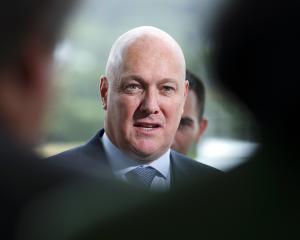The conference is important for Mr Cunliffe as he sets the scene for how the party will move into an election campaign mode.
In September, the then newly elected Labour leader would have been boosted by the Morgan Poll which showed Labour and the Greens at 47.5%, well ahead of National at 41% (down 3%).
The Morgan Poll is notoriously volatile and is regarded as more left-leaning than others. Nevertheless, in that poll, support for Labour rose to 32.5%, up 1%, and the Greens were 15%, up 1%.
If a general election was held at the time of sampling, a Labour-Green alliance would have easily won.
Fast forward to this week, and the latest Fairfax Media-Ipos Poll has delivered something of a blow to Labour.
The figures show a large gap between the two main parties. Labour is up 2% - to 33.6% - since the last Fairfax poll, completed in August before the leadership spill which saw Mr Cunliffe defeat David Shearer.
But National is 3% up, and holds a 17% lead over Labour according to these numbers, winning the backing of more than 50% of committed voters.
The September rise in the Morgan Poll was expected given the coverage provided through the travelling Labour leader roadshow, which toured New Zealand.
Mr Cunliffe and fellow contenders Shane Jones and Grant Robertson featured widely across all forms of media, lifting Labour's policy announcements front and centre.
But the reality of lifting Labour to a stronger and election-winning position is not as easy as changing leaders.
It should be remembered, however, that former prime minister Helen Clark led Labour through some of its lowest polling before she became New Zealand's first elected woman prime minister - a position she then held for nine years.
The worst that could happen now is for Labour to panic and start muttering about again changing its leader.
Labour supporters are not stupid.
While some may be impatient for it to return to government, the best plan for Labour is to stay the course and give Mr Cunliffe the support he received from party members and trade unions.
While Mr Cunliffe did not receive overwhelming support from his caucus colleagues, another spill now would see the end of any chance Labour has of returning to power next year.
The party faithful do, however, have other things to consider.
The conference looks set to approve a remit that will require its list to ''fairly represent'' gays and lesbians among candidates.
The New Zealand Council is also proposing a Maori-only list-ranking committee to rank Maori candidates for the next election.
And under another remit, Labour's list-ranking committee decisions will also have to aim for a caucus made up of at least 45% women next year, and at least 50% in 2017.
During his time as leader, Mr Shearer ditched the controversial so-called ''man-ban'' remit, which would have allowed for women-only selections in some electorates.
Mr Cunliffe is more open to the policy.
Two years ago, Labour MP Damien O'Connor was forced to apologise to the Labour caucus for his choice of words in criticising the party's ''gaggle of gays and self-serving unionists''.
While he apologised, he did not appear to back down from the concerns he expressed about factional interests within Labour dominating its list-ranking process at the cost of provincial representatives and ''straight shooters''.
While the remits may well have admirable aims, the question for Labour to consider is whether by introducing such measures it is in danger of losing the support of some long-time supporters.
Labour's Polynesian base, for instance, may be unlikely to support a gay and lesbian quota.
Others will ask where such moves will stop.
Should there be quotas for young, old, those with disabilities and working-class men?
And many supporters will feel that ensuring top class candidates - no matter their gender or sexual orientation - are available for selection is more important than attempting to govern by a prescribed set of numbers.
By trying to please everyone, Mr Cunliffe runs the risk of pleasing no-one.












